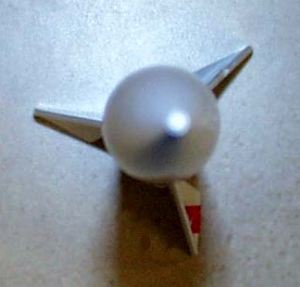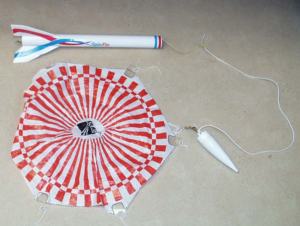| Diameter: | 0.98 inches |
| Length: | 12.00 inches |
| Manufacturer: | Quest  |
| Skill Level: | 2 |

(Contributed - by Mike Goss - 05/10/02)

 Intro
Intro
The Spin Fin is a 3 fin sport rocket from Quest with a unique twist.
Construction Rating: 4 out of 5
As this was my first model rocket from Quest I was curious to see how Quest compares to the other rocket manufactures that are on the sport rocketry market. I was favorably impressed with the kit, it’s instructions and the materials. And since Quest rockets are less expensive than the other more well known rocket company, this quest kit is a good bargain for the rocketeer. I purchased this kit at Hobby Lobby for $6.78, which compares well with the Internet bargain stores. Quest sells their kits in the now common clear plastic bag. All of the parts in the kit were there and in good shape. The kit consists of a sheet of pre-cut balsa fins, a body tube, a motor mount, a plastic nose cone and a plastic 12" parachute
The instructions come printed double sided on three sheets of paper. the first two sheets are the basic instructions to build the rocket, and the last sheet contains the preparation and launch instructions. The NAR safety code is also printed on the backside of the display card. The instructions are profusely illustrated and should be easily followed by the novice rocketeer. The instructions are in a logical order for the construction of the rocket. The only Issue that I have with the instructions is that in step number nine they call for you to thread the shock cord, which is attached to the motor mount, through the body tube, and then glue the motor mount into the body tube. This leaves the possibility of getting glue on the shock cord, which could potentially weaken it. Instead of threading the shock cord through the body tube, one should thread it through the center of the motor mount, and out the bottom of the rocket. In this way there is no chance of getting glue on the shock cord. There is the usual body tube marking template in the instructions.
 The model goes
together well. It shows that the instructions are well thought out and the
components of the kit are of good quality. Your standard compliment of hobby
tools, knife, pencil, glue and sandpaper, is sufficient for building this
rocket. This gives the modeler a good solid rocket for a very reasonable price.
The gluing of the spin tabs on the fins is a little tricky, but the alignment
of the tabs is not extremely critical since the fins themselves are of
sufficient size for stability. The spin tabs provide the spin that is the
gimmick for this rocket.
The model goes
together well. It shows that the instructions are well thought out and the
components of the kit are of good quality. Your standard compliment of hobby
tools, knife, pencil, glue and sandpaper, is sufficient for building this
rocket. This gives the modeler a good solid rocket for a very reasonable price.
The gluing of the spin tabs on the fins is a little tricky, but the alignment
of the tabs is not extremely critical since the fins themselves are of
sufficient size for stability. The spin tabs provide the spin that is the
gimmick for this rocket.
The rocket is finished in basic white paint. The decals or more properly, a sheet of self-adhesive stickers have a good color saturation for applying to a white rocket. If you are painting this rocket another color, they are not opaque enough to keep something other than white from bleeding through, a common problem that I have found with this type of decals. There are two decals, one is a ring that is applied near the nose cone of the rocket, and the other is a large graphic that spans two fins and half of the body tube. The latter decal is difficult to apply and seat, where a waterslide decal here would be much easier to apply. I ended up cutting the decal into two pieces to apply it and I still was not happy with the results. With the exception of the difficulty with the large decal, the model is easily finished and looks very close to the picture supplied with the kit.
Flight Recovery Rating: 5 out of 5
Quest Recommends the A6-4, B6-4, C6-5 and C6-7 motors for this model. The
motor is held in place in a quick release engine mount by a metal clip, making
changing the motors quick and easy. The recovery system consists of a
combination Kevlar®
and elastic shock cord, and a 12" parachute. The Kevlar cord is attached
to the front centering ring of the motor mount and the elastic as attached to
it and runs up to the nose cone. The resultant shock cord is at least twice as
long as the model. The 12" parachute is assembled following instructions
printed on the periphery of the parachute that are removed in the building
process. The material seems light and flimsy, but held up well in the launch.
The shroud line attachment is made to self-adhesive rectangles that are put on
each corner. These are stiff and do not bend easily, and as a result make the
parachute difficult to pack into the rocket. However they are very sturdy and
should last for many flights. Preparation is typical for any small model
rocket. I used 4 squares of Estes wadding in the rocket and there was
absolutely no scorching of the recovery system. One will need to ensure that
only the Kevlar portion of the shock cord is below the wadding.

The first and only flight of Spin Fin was using an Estes A8-3 motor. The launch was straight and the ejection charge blew about 1 second after the rocket reached apogee, close to perfect. The parachute opened quickly and the descent was at a good rate, not too fast as to cause damage to the rocket, and not too slow as to drift a long distance away from the launch sight. The rocket was returned undamaged and ready to prep for another flight. On the second attempt, the batteries were dead in the launch controller (should have charged them after the winter) so I reluctantly packed up and went home.
Overall Rating: 4½ out of 5
All things considered this is a nice sport rocket that has unique spin stabilization. The kit is solidly built, has a good recovery system with the Kevlar® shock cord. The low price of the Quest rocket line makes them in my opinion to be an excellent value for the rocket-loving public. The only negatives are the shroud line mounts and step nine in the instructions that needs to be improved. The positives are an inexpensive sturdy model with unique stabilization that will be fun to watch spin on it’s flights.
 |
 |
Flights
 |
 |
 |
 |
C.B.G. (November 12, 2003)